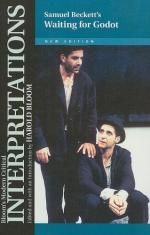|
This section contains 5,645 words (approx. 19 pages at 300 words per page) |

|
SOURCE: Kumar, K. Jeevan. “The Chess Metaphor in Samuel Beckett's Endgame.” Modern Drama 40, no. 4 (winter 1997): 540-52.
In the following essay, Kumar argues that the chess symbolism in Endgame serves as a unifying element for the play as well as a metaphor for existential uncertainty and despair.
Samuel Beckett's drama depicts a relentless search for the central self1 or the ultimate being which remains unidentified, unseen and unattainable. Time makes this search an unending process by presenting the seeker with the illusion of being static and at the same time creating a flux, making the distinction between illusion and reality blurred. The central self which eschews the seeker is often presented in Beckett's works as a non-existent entity. In Waiting for Godot the central self that the tramps could never get at is presented as the enigmatic Godot.2 Alain Robbe-Grillet observes that “Godot is the inaccessible self.”3 In Watt...
|
This section contains 5,645 words (approx. 19 pages at 300 words per page) |

|


